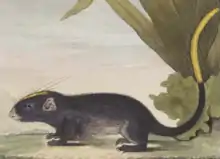| Echimys Temporal range: Pleistocene to Recent | |
|---|---|
 | |
| Echimys chrysurus | |
| Scientific classification | |
| Domain: | Eukaryota |
| Kingdom: | Animalia |
| Phylum: | Chordata |
| Class: | Mammalia |
| Order: | Rodentia |
| Family: | Echimyidae |
| Subfamily: | Echimyinae |
| Tribe: | Echimyini |
| Genus: | Echimys F. Cuvier, 1809[1] |
| Type species | |
| Myoxus chrysurus | |
| Species | |
| Synonyms | |
|
Echinomys Wagner, 1840[2] | |
Echimys is a genus of the spiny rats family, the Echimyidae.[1][3] Members of this genus are collectively called spiny tree-rats.
The genus name Echimys, and also its synonym Echinomys,[2] derive from the two Ancient Greek words ἐχῖνος (ekhînos), meaning "hedgehog", and μῦς (mûs), meaning "mouse, rat".[4][5]
Classification
The genus contains three extant species
- White-faced spiny tree-rat - Echimys chrysurus
- Dark spiny tree-rat - Echimys saturnus
- Vieira's spiny tree-rat - Echimys vieirai
Members of the genera Callistomys, Makalata, Pattonomys, and Phyllomys were all formerly considered part of the genus Echimys.
Phylogeny
Echimys is the sister genus to Phyllomys, and then to Makalata. These taxa are closely related to the genera Pattonomys and Toromys. In turn, these five genera share phylogenetic affinities with a clade containing the bamboo rats Dactylomys, Olallamys, Kannabateomys together with Diplomys and Santamartamys.[6]
| Genus-level cladogram of the Echimyini. | |||||||||||||||||||||||||||||||||||||||||||||||||||||||||||||||||||||||||||
| |||||||||||||||||||||||||||||||||||||||||||||||||||||||||||||||||||||||||||
| The cladogram has been reconstructed from mitochondrial and nuclear DNA characters.[7][8][9][10][11][12][13][14][6] |
References
- 1 2 Cuvier, Frédéric (1809), "Extrait des premiers Mémoires de M. F. Cuvier, sur les dents des Mammifères considérées comme caractères génériques", N. Bull. Sci. Soc. Philomath. Paris (in French), 1 (24): 393–395
- 1 2 Wagner, Johann Andreas (1840), "Beschreibung einiger neuer Nager, welche auf der Reise des Herrn Hofraths v. Schubert gesammelt wurden: mit Bezugnahme auf einige andere verwandte Formen", Abhandl. Math.—Physik. König. Bayer. Akad. Wiss. München (in German): 191–210
- ↑ Woods, C.A.; Kilpatrick, C.W. (2005). "Genus Echimys". In Wilson, D.E.; Reeder, D.M (eds.). Mammal Species of the World: A Taxonomic and Geographic Reference (3rd ed.). Johns Hopkins University Press. p. 1578. ISBN 978-0-8018-8221-0. OCLC 62265494.
- ↑ Bailly, Anatole (1981-01-01). Abrégé du dictionnaire grec français. Paris: Hachette. ISBN 978-2010035289. OCLC 461974285.
- ↑ Bailly, Anatole. "Greek-french dictionary online". www.tabularium.be. Retrieved October 20, 2017.
- 1 2 Fabre, Pierre-Henri; Upham, Nathan S.; Emmons, Louise H.; Justy, Fabienne; Leite, Yuri L. R.; Loss, Ana Carolina; Orlando, Ludovic; Tilak, Marie-Ka; Patterson, Bruce D.; Douzery, Emmanuel J. P. (2017-03-01). "Mitogenomic Phylogeny, Diversification, and Biogeography of South American Spiny Rats". Molecular Biology and Evolution. 34 (3): 613–633. doi:10.1093/molbev/msw261. ISSN 0737-4038. PMID 28025278.
- ↑ Lara, Márcia C.; Patton, James L.; da Silva, Maria Nazareth F. (1996). "The Simultaneous Diversification of South American Echimyid Rodents (Hystricognathi) Based on Complete Cytochrome b Sequences". Molecular Phylogenetics and Evolution. 5 (2): 403–413. doi:10.1006/mpev.1996.0035. PMID 8728398.
- ↑ Leite, Yuri L. R.; Patton, James L. (2002). "Evolution of South American spiny rats (Rodentia, Echimyidae): the star-phylogeny hypothesis revisited". Molecular Phylogenetics and Evolution. 25 (3): 455–464. doi:10.1016/s1055-7903(02)00279-8. PMID 12450750.
- ↑ Galewski, Thomas; Mauffrey, Jean-François; Leite, Yuri L. R.; Patton, James L.; Douzery, Emmanuel J. P. (2005). "Ecomorphological diversification among South American spiny rats (Rodentia; Echimyidae): a phylogenetic and chronological approach". Molecular Phylogenetics and Evolution. 34 (3): 601–615. doi:10.1016/j.ympev.2004.11.015. PMID 15683932.
- ↑ Upham, Nathan S.; Patterson, Bruce D. (2012). "Diversification and biogeography of the Neotropical caviomorph lineage Octodontoidea (Rodentia: Hystricognathi)". Molecular Phylogenetics and Evolution. 63 (2): 417–429. doi:10.1016/j.ympev.2012.01.020. PMID 22327013.
- ↑ Fabre, Pierre-Henri; Galewski, Thomas; Tilak, Marie-ka; Douzery, Emmanuel J. P. (2013-03-01). "Diversification of South American spiny rats (Echimyidae): a multigene phylogenetic approach". Zoologica Scripta. 42 (2): 117–134. doi:10.1111/j.1463-6409.2012.00572.x. ISSN 1463-6409.
- ↑ Loss, Ana; Moura, Raquel T.; Leite, Yuri L. R. (2014). "Unexpected phylogenetic relationships of the painted tree rat Callistomys pictus (Rodentia: Echimyidae)" (PDF). Natureza on Line. 12: 132–136.
- ↑ Fabre, Pierre-Henri; Vilstrup, Julia T.; Raghavan, Maanasa; Der Sarkissian, Clio; Willerslev, Eske; Douzery, Emmanuel J. P.; Orlando, Ludovic (2014-07-01). "Rodents of the Caribbean: origin and diversification of hutias unravelled by next-generation museomics". Biology Letters. 10 (7): 20140266. doi:10.1098/rsbl.2014.0266. ISSN 1744-9561. PMC 4126619. PMID 25115033.
- ↑ Upham, Nathan S.; Patterson, Bruce D. (2015). "Evolution of Caviomorph rodents: a complete phylogeny and timetree for living genera". In Vassallo, Aldo Ivan; Antenucci, Daniel (eds.). Biology of caviomorph rodents: diversity and evolution. Buenos Aires: SAREM Series A, Mammalogical Research — Sociedad Argentina para el Estudio de los Mamíferos. pp. 63–120.